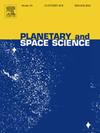Performance evaluation of pansharpening for planetary exploration: A case study on the implementation of TGO CaSSIS with MRO HiRISE
IF 1.7
4区 物理与天体物理
Q3 ASTRONOMY & ASTROPHYSICS
引用次数: 0
Abstract
The present study analyses the potential of pansharpening algorithms for planetary exploration studies, testing their performance with the 4-band images from the Colour and Stereo Surface Imaging System (CaSSIS) aboard the Exomars 2016 Trace Grace Orbiter (TGO) using HiRISE images from the Mars Reconnaissance Orbiter (MRO) mission as the base. Due to the lack of suitable open-source tools, a suite of scripts was developed to improve alignment between images and enable different component substitution (CS) pansharpening algorithms. The tools developed were tested on a database of images encompassing several regions of Mars to explore its vast diversity in colours, tones, and textures. Then, the resulting images were investigated using spectral and structural performance indices, comparing the results with the source images and the colour information from the HiRISE central channels.
The results show that a substantial number of the tested algorithms are more than suitable for data enhancement, showing a considerable improvement in the structural characteristics of the images without sacrificing their spectral characteristics. In detail, the Gram-Schmidt method, widely used in terrestrial pansharpening, turns out to be the best compromise among the tested algorithms. Regarding the other tested algorithms, GIHS and the MMSE Brovey, a modified version of the classic Brovey, show the most significant increase in structural properties, while GHPF and GHPM show the interesting ability to maintain virtually unchanged spectral conditions of the multispectral source data.
In addition, the analysis reveals the applicability of pansharpening at a ground resolution increment up to 18 times, from 4.5 up to 0.25 m/px, a broader range than is usually used in traditional pansharpening.
行星探测平刨的性能评估:利用 MRO HiRISE 实施 TGO CaSSIS 的案例研究
本研究以火星勘测轨道飞行器(MRO)任务的 HiRISE 图像为基础,利用 Exomars 2016 Trace Grace Orbiter(TGO)上的彩色和立体表面成像系统(CaSSIS)的 4 波段图像测试了平锐化算法的性能,分析了平锐化算法在行星探索研究中的潜力。由于缺乏合适的开源工具,我们开发了一套脚本来改进图像之间的对齐,并启用不同的组件替换(CS)平锐化算法。开发的工具在一个包含火星多个区域的图像数据库中进行了测试,以探索火星在色彩、色调和纹理方面的巨大多样性。结果表明,相当多的测试算法都非常适合用于数据增强,在不牺牲光谱特性的情况下大大改善了图像的结构特性。具体来说,在陆地平锐化中广泛使用的格拉姆-施密特方法是测试算法中的最佳折中方案。关于其他测试算法,GIHS 和 MMSE Brovey(经典 Brovey 算法的改进版)在结构特性方面的提升最为显著,而 GHPF 和 GHPM 则在保持多光谱源数据的光谱条件几乎不变方面表现出了令人感兴趣的能力。此外,分析还揭示了在地面分辨率增量高达 18 倍(从 4.5 米/px 到 0.25 米/px)的情况下进行平差处理的适用性,这一范围比传统平差处理通常使用的范围更广。
本文章由计算机程序翻译,如有差异,请以英文原文为准。
求助全文
约1分钟内获得全文
求助全文
来源期刊

Planetary and Space Science
地学天文-天文与天体物理
CiteScore
5.40
自引率
4.20%
发文量
126
审稿时长
15 weeks
期刊介绍:
Planetary and Space Science publishes original articles as well as short communications (letters). Ground-based and space-borne instrumentation and laboratory simulation of solar system processes are included. The following fields of planetary and solar system research are covered:
• Celestial mechanics, including dynamical evolution of the solar system, gravitational captures and resonances, relativistic effects, tracking and dynamics
• Cosmochemistry and origin, including all aspects of the formation and initial physical and chemical evolution of the solar system
• Terrestrial planets and satellites, including the physics of the interiors, geology and morphology of the surfaces, tectonics, mineralogy and dating
• Outer planets and satellites, including formation and evolution, remote sensing at all wavelengths and in situ measurements
• Planetary atmospheres, including formation and evolution, circulation and meteorology, boundary layers, remote sensing and laboratory simulation
• Planetary magnetospheres and ionospheres, including origin of magnetic fields, magnetospheric plasma and radiation belts, and their interaction with the sun, the solar wind and satellites
• Small bodies, dust and rings, including asteroids, comets and zodiacal light and their interaction with the solar radiation and the solar wind
• Exobiology, including origin of life, detection of planetary ecosystems and pre-biological phenomena in the solar system and laboratory simulations
• Extrasolar systems, including the detection and/or the detectability of exoplanets and planetary systems, their formation and evolution, the physical and chemical properties of the exoplanets
• History of planetary and space research
 求助内容:
求助内容: 应助结果提醒方式:
应助结果提醒方式:


